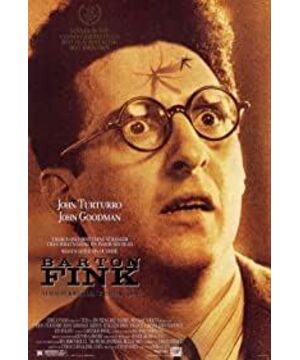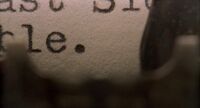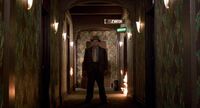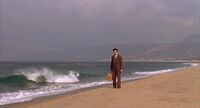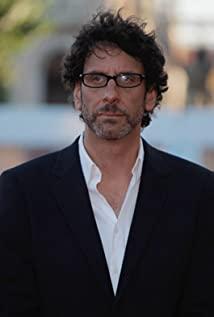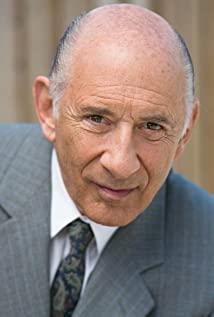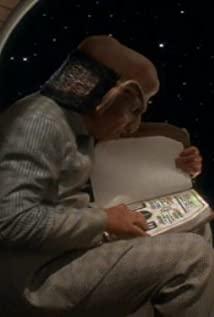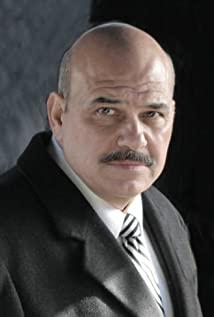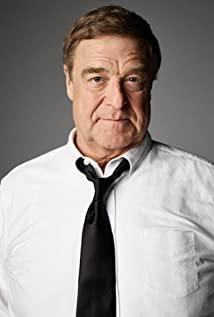Actually I think Funk submits last It is a story of wrestling with the soul, and this story is the content of the whole film, it is the story of Barton and Charlie wrestling, Charlie is Barton's own imagination, which means his soul. The film finally submits his wrestling with Funk The script is over, and at the same time it also completes the description of the script, that is, the struggle between abnormal contradictions and psychology, a story of one person fighting against another self. The Coen brothers completed a bright story and also completed the description of a dark story, making fantasy and Reality has reached unity. The film is about how Funk wrote a screenplay about wrestling, and the content of the film is the story of Funk wrestling with his soul.
The key to the film is Funk's neighbor Charlie in the hotel. I understand Charlie this The setting of the characters and the understanding of the film should be of great help.
Charlie has appeared four or five times in total. First, let's take a look at the scenes of each appearance of Charlie:
The first time was when Fink complained that Charlie was too noisy. After the waiter went to Charlie's room, Charlie's lines were like this: hello, what? Who? Everyone, like Funk, was waiting for the neighbors to arrive. All of this happened after Funk looked at the beautiful seaside beauty and drew a fascination. I think all this is almost Funk's imagination. Maybe after the waiter persuaded, the neighbors have been quiet. The subsequent knock on the door, then Charlie's arrival and the conversation between the two of them was Fink's imagination. This scene finally pulled Funk back from his imagination with the sound of the wallpaper falling off, and Funk looked away from the mural. I think it should be true that the wallpaper fell off. Funk must have told the waiter about this later. The waiter put a box of tacks in Funk's room and wrote his name.
The second time Charlie's appearance is more sudden. While Fink was repairing the wallpaper, he heard the merry-making voices of the men and women next door. Then Fink returned to his seat and stared at the typewriter in a daze. At this time, the camera kept zooming in on the typewriter until it became a little blurry, and then slowly shifted to the text, and then suddenly, Charlie appeared. This time there is a detail that I don't know if you have noticed it. Charlie's ear is inflamed, pay attention to the right ear! At the end of Charlie's outbreak, there's a close-up of his left ear oozing pus. What they're discussing here says they're both the same, lonely people. Then Charlie taught him wrestling, and here Charlie is on the floor, and having Fink come over and try that look is so profound, it's unreal.
In the third appearance of Charlie, Fink looked at the poor script and thought hard, and only continued with one sentence: the big guy in the sweatshirt. When the camera freezes here, Charlie suddenly appears again. Come in with your shoes. Regarding the voices of the men and women next to Funk, Charlie not only said he could hear them clearly, he could see how they were doing. As netizens said, if Charlie really lived next door to Funk, how did he hear it. Here Charlie mentions that he is leaving for New York for a few days. The final shot is of Funk staring at the wall in a daze. Something that seems to be looking at the wall. There is a Kafka fantasy feel to it.
The fourth Charlie's appearance is when Fink finds the woman dead and goes to Charlie for help. There are more doubts here. If it is true that Charlie killed a woman as the police said later, why did Charlie vomit in disgust when he saw the body in the room. And Fink yelled before. When I ran to open the door, I saw Charlie. If it was really Charlie who heard it next door, why didn't the waiter hear it? Because the waiter had almost reached the exit of the corridor when Funk went to open the door to look after a while, considering the time, the waiter should have been near his room when Funk shouted. At that time, Charlie stood at the door but didn't see the waiter, so it was Fink's imagination, his own shout, Charlie at the door. Dead bodies on the bed, etc. The night before, when Funk was having sex with the lady, the camera zoomed to the pool, and then a water pipe in the middle. It was too much like Kafka looking at the speck on the wall and starting to fantasize. Since then, Charlie has started his own imaginary world.
Since then, Funk has actually stayed in the room and never went out. I guess it should be in the room to write his movie script. Going to the villa to meet the tycoon is an imaginary, where LOU was fired by the tycoon because of his talkativeness, but at the end of the office, LOU was still there. Even tycoons kneel and lick Fink's feet, but in reality writers like Fink have a lot of Hollywood. In the eyes of tycoons, Fink is nothing. Open the Bible, the first page is his own movie script is of course imaginary. Including the arrival of the police later is a story in Funk's script. Even that dance was Funk's fantasy. At the dance, he proudly said that he was a creator, dancing to male and female music, dancing jazz music, and fighting between marine and land soldiers. It is probably a figurative expression of the excitement in his mind after the completion of his works.
Later, when the police were in Funk's room, the film began to climax. Under the police's questioning, Funk said that Charlie was coming back soon, and emphasized: we wrestling, charlie's back, and then the elevator rang, see The next surreal expressionism, everyone should know, is not real. At this time, Charlie's left ear leaked pus, which contradicted Charlie's previous statement that his right ear was inflamed. Here, there is another detail that also shows Funk's inner contradiction, struggle and struggle, that is, Fink is a Jew, while his opponent, Charlie, is a fascist. In the context of World War II at that time, the relationship between Jews and fascists is well known to everyone. Charlie finally said that he lived next door and could come to him if he had anything. After all, Fink's own soul is inseparable from himself no matter what.
In the end, after Fink completed the script, he ended his struggle and went to reality. The tycoon in the film company is still the aggressive businessman, and LOU is still standing in the office. How can he be fired? Then after a meal of criticism, Fink was kept in Hollywood because of contract issues. If there were those murders, would Fink still be able to sit still? Seeing this, it is even more conclusive that the previous murder case, as well as the story of the police, the hotel firefight is all Fink's imagination. Seeing this, I suddenly understand that this is the specific plot of the script about wrestling that Fink completed.
But what is in the box that Funk is carrying is still unknown. In his imagination, as everyone thinks, it seems to be the head of a woman, but Funk carried him to reality. went, so a little confused. This box not only exists in imagination, but also exists in reality. It sometimes makes me feel like Charlie kills the woman, cuts off the head, and puts it in the box as if it really happened.
Finally, Fink walked to a beach and saw a woman. At first, I also thought that Charlie seemed to have walked into the painting, so I couldn't help asking, are you in pictures? Don't be silly is the woman's answer, Then I compared the final scene and the painting is still a little different, that is, there is one less umbrella. So maybe Fink didn't walk into the painting at all, but did come to a beach and saw a woman.
After reading it, I felt that the main scene of this movie happened in Funk's room. In fact, as a writer, Fink was really thinking hard in the room but couldn't write his works, so he often stared at the murals on the wall in a daze. Everything that happened in the room should be his imagination after being in a daze. Especially with Charlie. The whole movie feels very psychedelic.
Well, I have never written a video. After writing this, I don’t even want to read what I wrote again. I just want to think about my own thoughts after watching it for a while. Thank you for sharing it with everyone. .
View more about Barton Fink reviews


